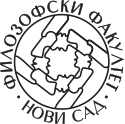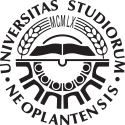15EJEJ34 - Contemporary English Novel
| Course specification | ||||
|---|---|---|---|---|
| Course title | Contemporary English Novel | |||
| Acronym | 15EJEJ34 | |||
| Study programme | English language and literature | |||
| Module | ||||
| Type of study | first degree undergraduate academic studies | |||
| Lecturer (for classes) | ||||
| Lecturer/Associate (for practice) | ||||
| Lecturer/Associate (for OTC) | ||||
| ESPB | 3.0 | Status | ||
| Condition | Oblik uslovljenosti | |||
| The goal | The aim of the course is to provide an overview of major thematic, formal and stylistic tendencies in contemporary British novel, spanning the period of the final two decades of the 20th century. | |||
| The outcome | Theoretical aspects: Students are able to notice, explain and analyze common features of different authors’ work falling under the umbrella term of Contemporary British Novel, focusing on the narrative technique, genre classification and chosen thematic issues, while at the same time being aware of their unique traits. Practical aspects: Students are able to apply literary analysis skills to their reading of the chosen texts, finding their theoretical grounding in the relevant critical texts and poetics of postmodernism. | |||
| Contents | ||||
| Contents of lectures | The notion of ‘contemporary British novel’ in relation to Postmodernism, (post)Feminism, contemporary culture, consumerist society, entertainment industry, and popular fiction. Martin Amis: contemporary novel and 20th century consumerist culture; stylistic uniqueness. Julian Barnes: postmodernist history of the world and the problem of genre. Angela Carter: magical realism, entertainment industry and gender issues. Graham Swift: collective and individual histories. Salman Rushdie: East and West, interculturalism, fantastic elements in contemporary novel. Nick Hornby: genre fiction, lad-lit, popular novel, the notion of ‘bestseller’. | |||
| Contents of exercises | Discussion on topical issues (thematic, formal, stylistic) related to the individual novels. | |||
| Literature | ||||
| ||||
| Number of hours per week during the semester/trimester/year | ||||
| Lectures | Exercises | OTC | Study and Research | Other classes |
| 2 | 2 | |||
| Methods of teaching | Lectures, literary analysis, discussion, self-study | |||
| Knowledge score (maximum points 100) | ||||
| Pre obligations | Points | Final exam | Points | |
| Activites during lectures | Test paper | 30 | ||
| Practical lessons | Oral examination | 30 | ||
| Projects | ||||
| Colloquia | 20 | |||
| Seminars | 20 | |||

